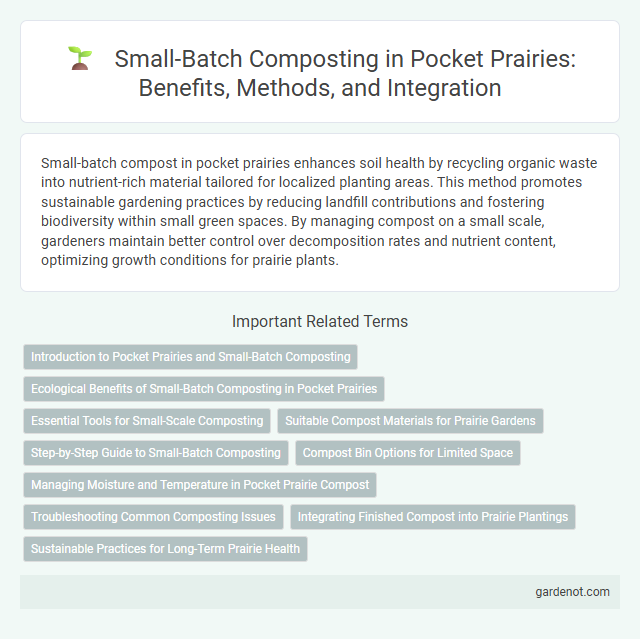Small-batch compost in pocket prairies enhances soil health by recycling organic waste into nutrient-rich material tailored for localized planting areas. This method promotes sustainable gardening practices by reducing landfill contributions and fostering biodiversity within small green spaces. By managing compost on a small scale, gardeners maintain better control over decomposition rates and nutrient content, optimizing growth conditions for prairie plants.
Introduction to Pocket Prairies and Small-Batch Composting
Pocket prairies are compact, biodiverse green spaces designed to support local ecosystems and enhance urban environments. Small-batch composting in these sites efficiently recycles organic waste, producing nutrient-rich soil amendments that promote healthy prairie plant growth. This sustainable practice reduces landfill contributions while fostering soil fertility and resilience within confined urban landscapes.
Ecological Benefits of Small-Batch Composting in Pocket Prairies
Small-batch composting in pocket prairies enhances soil fertility by delivering nutrient-rich organic matter directly to plant roots, promoting healthier and more resilient native vegetation. This method supports biodiversity by creating microhabitats for beneficial microbes, insects, and earthworms, which contribute to ecosystem balance and soil aeration. Efficient decomposition within small batches reduces greenhouse gas emissions compared to large-scale waste management, making it a sustainable practice for urban ecological restoration.
Essential Tools for Small-Scale Composting
Small-batch composting thrives with essential tools like compact compost bins, durable aeration tools, and moisture meters to maintain optimal conditions. Kitchen scraps, garden waste, and coffee grounds efficiently decompose when turned regularly using pitchforks or hand compost turners designed for smaller volumes. Effective small-scale composting reduces waste and enriches soil, making it ideal for pocket prairie gardens and urban green spaces.
Suitable Compost Materials for Prairie Gardens
Small-batch compost ideal for prairie gardens includes native plant clippings, fallen leaves, and small amounts of grass clippings to maintain the natural ecosystem balance. Incorporating carbon-rich materials like dried prairie flowers and straw enhances soil texture and nutrient retention. Avoiding manure or invasive plant residues prevents disruption to the delicate prairie soil microbiome and supports healthy native plant growth.
Step-by-Step Guide to Small-Batch Composting
Small-batch composting efficiently recycles kitchen scraps and garden waste into nutrient-rich soil amendments by following a simple step-by-step guide: start with a balanced mix of brown materials like dried leaves and green materials such as vegetable peels, maintain moisture levels similar to a damp sponge, and regularly aerate the pile to accelerate decomposition. Using a compact bin or container designed for small spaces allows for effective composting in urban or pocket prairie settings. Properly managing temperature, moisture, and aeration ensures the production of high-quality compost ideal for enriching pocket prairie soils.
Compost Bin Options for Limited Space
Small-batch composting suits pocket prairies by recycling organic matter efficiently in confined areas. Compact compost bins, such as tumbler models or stackable containers, optimize space while accelerating decomposition. Choosing a bin with ventilation and moisture control features ensures nutrient-rich compost production for healthy soil enrichment.
Managing Moisture and Temperature in Pocket Prairie Compost
Small-batch compost in pocket prairies requires precise management of moisture levels between 40% and 60% to facilitate microbial activity and prevent anaerobic conditions. Maintaining compost temperature between 130degF and 150degF accelerates organic matter breakdown while controlling pathogens and weed seeds. Regularly turning the pile ensures even heat distribution and moisture retention, optimizing nutrient-rich soil production for pocket prairie ecosystems.
Troubleshooting Common Composting Issues
Small-batch composting in a pocket prairie requires careful management to prevent common issues such as odors, slow decomposition, and pest invasions. Correcting moisture levels by maintaining a balance between green and brown materials can improve microbial activity and speed up composting. Addressing aeration by regularly turning the compost helps reduce unpleasant smells and creates an ideal environment for beneficial organisms.
Integrating Finished Compost into Prairie Plantings
Integrating small-batch finished compost into pocket prairie plantings enhances soil fertility by enriching microbial diversity and nutrient availability. This targeted application supports native prairie species' root development and resilience, promoting sustainable growth. Using nutrient-rich compost tailored for pockets of native ecosystems optimizes plant health and biodiversity restoration efforts.
Sustainable Practices for Long-Term Prairie Health
Small-batch composting enhances soil fertility by recycling organic matter directly within pocket prairies, reducing waste while promoting nutrient-rich, microbial diversity essential for plant resilience. This sustainable practice minimizes carbon footprint compared to large-scale compost systems and supports long-term prairie health by maintaining natural soil structure and moisture retention. Implementing small-batch compost contributes to the restoration of native prairie ecosystems by fostering a balanced, self-sustaining nutrient cycle.
Small-batch compost Infographic

 gardenot.com
gardenot.com